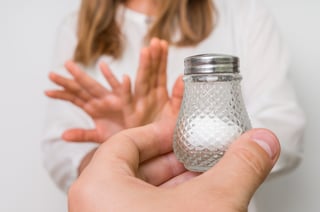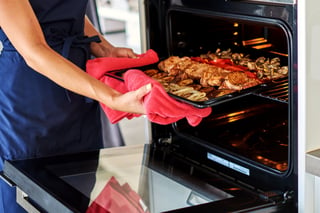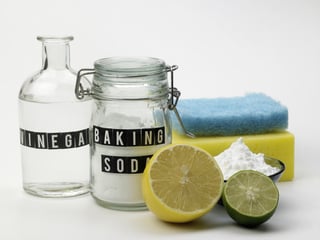this blog was updated on 5/2/2019

COPD is a term refers to a chronic lung disease that is a combination of emphysema, chronic bronchitis, and asthma. Regardless of which specific disease you have, COPD patients have similar symptoms such as:
- Shortness of breath
- Chronic cough
- Tightness in your chest
- High pitched, whistling sounds when you breath called wheezing
- Excessive mucus production
A challenge you will face is changing your eating habits to help decrease symptoms and exacerbations, but the change is vital to your health. Most likely, your current kitchen pantry will need to be updated to include COPD friendly foods and new ways of cooking. Change can be difficult, and with your COPD it probably seems like you have had to change many of the activities that bring you joy. Together, we will cover information to help this transition be as easy as possible, and educate you on what you should have available in your kitchen and what you shouldn’t. With some changes in your cooking technique you will find that you feel better, and you might be surprised how delicious healthy eating can be.
Decrease your Salt (Sodium) Intake
In general, the daily salt ingestion limit for a healthy person is 1500 mg. For a patient with COPD, it needs to be much less. Your body is, for the most part, water. An excess of salt will raise your sodium levels, causing your body to retain too much water. This leads to a condition called edema, otherwise known as swelling in your hands, feet, or ankles. When you add COPD to the equation, your weakened lungs can be another area where fluid accumulates, making it even harder for you to breathe. Decreasing your sodium intake will help prevent edema, improving your breathing and exercise tolerance. Some ways to cut down salt in your diet are:
- Get rid of the salt shakers and containers of salt.

- Salt substitutes, such as Mrs. Dash, are a great medley of herbs that flavor food.
- Stay away from processed foods as these are loaded with excess salt.
- Grow a garden or buy a share in a local farm to enjoy fresh produce.
- Educate your family on new ways to cook with minimal amounts of salt.
- Have low salt recipes and cookbooks handy when you prepare meals.
Foods that Cause Gas
Excess gas from eating certain foods causes abdominal discomfort. When gas pressure in your abdomen increases dramatically, it can also restrict your diaphragms ability to expand, which negatively impacts your ability to breathe. While everyone responds to foods differently, it’s important to know what foods cause your gas and to avoid these if possible. The following foods are known to cause excess gas and need to be considered as you try and manage your COPD:
- Alcohol
- Peppers
- Cucumbers
- Hard cider
- Peas
- Corn
- Raw onions
- Aged cheeses
- Yogurt
- Nuts
- Cauliflower
- Turnips
- Mushrooms
- Carbonated beverages
- Sweet potatoes
- Milk cabbage
- Spicy foods
- Coffee creamer
- Popcorn
This list is not meant to be exhaustive. You will need to examine your past issues with food and gas and decide foods need to be cut down on or eliminated from your diet completely.
Food Preparation
Your energy levels will fluctuate depending on the symptoms of your COPD. Due to this  fluctuation, you need to figure out what the best times of the day are to prepare your meals. When people are tired they tend to fall into the trap of eating whatever they can get their hands on quickly, which often ends up being processed or fast foods, with little nutritional value. Planning out your meals for the week and cooking during the times of the day you feel like you have the most energy is the key to maintaining a healthy diet, which will also give your body the nourishment it needs to feel good. Prepare your meals when you are feeling the most energized and you will spend the extra time to cut up the fresh vegetables or prepare real food instead of relying on a meal out of a can. Even though you are preparing healthy meals, it doesn’t mean these meals can’t be simple, fast, and delicious. Use the oven instead of frying and use a steamer for vegetables, simplifying your meal preparation. While the meal is baking, you can take a rest if you need it. There are many excellent websites with healthy, simple recipes, or if you need a little more encouragement, a nutritionist can be an excellent source of information on what meals and foods you can eat to provide optimal nutrition.
fluctuation, you need to figure out what the best times of the day are to prepare your meals. When people are tired they tend to fall into the trap of eating whatever they can get their hands on quickly, which often ends up being processed or fast foods, with little nutritional value. Planning out your meals for the week and cooking during the times of the day you feel like you have the most energy is the key to maintaining a healthy diet, which will also give your body the nourishment it needs to feel good. Prepare your meals when you are feeling the most energized and you will spend the extra time to cut up the fresh vegetables or prepare real food instead of relying on a meal out of a can. Even though you are preparing healthy meals, it doesn’t mean these meals can’t be simple, fast, and delicious. Use the oven instead of frying and use a steamer for vegetables, simplifying your meal preparation. While the meal is baking, you can take a rest if you need it. There are many excellent websites with healthy, simple recipes, or if you need a little more encouragement, a nutritionist can be an excellent source of information on what meals and foods you can eat to provide optimal nutrition.
Plan Your Grocery Shopping
Make a plan before going grocery shopping, this should include what foods you need, a route you will take to minimize your exertion, and also a plan for what to do if you get tired and need to rest. Make a grocery list and stick to it. Research foods that are conducive to COPD management and make sure you like the foods you will buy. When at the grocery store, stick to the outside aisles. The outside aisles have the fresh fruits, vegetable, and mostly non-processed foods. Of course, you will need to venture into the “danger zone” for a few items, but avoid going aisle to aisle and just go to the areas that have what you need. Also, make sure you eat a good meal prior to shopping to avoid impulse buying due to hunger.
While at the grocery store, see if a scooter is available. Also, don’t be afraid to ask for assistance. Most stores will assign an associate to go with you so you don’t have reach up high for items. After checking out, make sure to ask for help to your car. This will keep you from overexerting yourself lifting bags into the trunk. When you arrive home, take your time taking the groceries inside. Better yet, ask a friend to meet you to help or go at a time that a friend or a spouse can accompany you. Another option, if you can afford it, is to hire a personal helper that can do your shopping for you.
A new option coming to many groceries stores is online ordering. You can purchase your groceries through an app on your smart phone or on the grocery stores' website. You can then decide if you want to go pick up the groceries or if you want them delivered to your home. If you pick up your groceries, the assistant will often load the groceries into your car for you. You can also purchase a collapsible cart to load groceries into and bring into your home. If you choose to get your groceries delivered, you can ask the delivery person to bring them into your home or kitchen so you can unload the items one at a time. Both can cost an extra 5-15 dollars, but it may be worth it for your health. It may also prevent you from buying any unnecessary items when wandering the store.
Kitchen Arrangement
Arranging your kitchen in a strategic way to avoid unnecessary steps can decrease the amount of energy you expend, preventing exhaustion and making cooking more enjoyable. Be sure to have all commonly used utensils at an easy to reach level to avoid unnecessary stretching and reaching. The same goes for all foods, spices and dishes you use on a regular basis. Rearrange your kitchen to be efficient at energy management as well as meal preparation. Do not put items you use on a regular basis in high cupboards or places that are not easy to get to. Keep spices and commonly used ingredients at a height that doesn’t include standing on a stool or stretching your arms above your head. Repeatedly reaching for items above your head can be more tiresome than you think, and the last thing you want to do is fall off a step stool and injure yourself because you are short of breath
Cleaning your Kitchen
Oven cleaners, cleaning sprays, and other household cleaners can be very irritating to  your airway. The fumes from these cleaners will make your COPD symptoms worse and sometimes even cause exacerbation. If you have any generic cleaners or cleaners that contain ammonia or bleach, consider replacing them with a “green” variety. Another way to help is using good old-fashioned soap and water, baking soda, and vinegar. Along with using lung friendly cleaners, you need to make sure that the kitchen is well ventilated before you start cleaning. Open a window, turn on some fans, and make sure there is plenty of fresh air to help you breathe easier.
your airway. The fumes from these cleaners will make your COPD symptoms worse and sometimes even cause exacerbation. If you have any generic cleaners or cleaners that contain ammonia or bleach, consider replacing them with a “green” variety. Another way to help is using good old-fashioned soap and water, baking soda, and vinegar. Along with using lung friendly cleaners, you need to make sure that the kitchen is well ventilated before you start cleaning. Open a window, turn on some fans, and make sure there is plenty of fresh air to help you breathe easier.
If you don’t have to do the cleaning, don’t. If you’re lucky enough to have someone to help, take advantage of it. The correct cleaners and ventilation still need to be used, but you can completely exit the area and not come back until things have aired out. If you must do the cleaning, consider wearing a respirator mask to minimize any irritating effects on your airway.
Additional Considerations
If you are on oxygen therapy and wear an apparatus, don’t use a gas stove or cook on a barbeque grill. As I’m sure you are aware, an open flame and concentrated oxygen do not mix. Use electric stoves, ovens, toaster ovens, and microwaves.
- Foods to keep on hand and easily accessible when you’re ready to cook include: whole grain varieties, lots of vegetables, lean protein, legumes, low-fat milk or a nut milk, nuts, fruits, and plenty of water.
- If possible, sit when working in the kitchen. Consider purchasing an adjustable stool to be prepared for all situations.
- Be sure to use the exhaust fan while cooking to reduce heat, fumes and moisture.
- If you find walking or lifting is difficult, try using a rolling cart to transport items.
- When you cook, cook large meals. With the leftovers, put in appropriate containers and freeze to have a no-prep meal. This will come in handy on the days you are too tired to cook.
- When baking, be sure to use aluminum foil for easy clean-up and to avoid scrubbing.
- Soak pots and pans for easier cleaning.
- When cleaning up after a meal, put the food away that needs to be refrigerated first. Depending on how you feel, keep going or take a break. The rest of clean-up can wait.
- After dishes are washed, put the pots and pans you use most often back on the stove.
- Try eating smaller meals 6-7 times a day. It takes a lot of energy to eat and digest food and you should try and eat small amounts at each sitting.
- If some items you use are difficult to reach, get yourself an extendable grabbing tool.
- Consider healthy, quick options. There are microwave meals that use little to no salt and offer healthy choices. Supplementing these quick options throughout the week can make your life easier.
- Enlist all the help you can get. Whether it be a friend that delivers meals, a family member that you can alternate cooking/cleaning duties with, or a personal care attendant, any help you can get in the kitchen and around the house will save you valuable energy.
Carefully managing your COPD can help control your symptoms, reduce risk of complications, and improve your quality of life. Meal preparation and kitchen design is an important part of organizing you daily activities to save energy. Take the steps now to set-up your kitchen in an efficient manner, and get rid of foods that can worsen your COPD. Involve a friend, or make it a family project, remember, you are not on your own. A little planning and small adjustments here and there can have a positive effect on both your well-being and your health.



